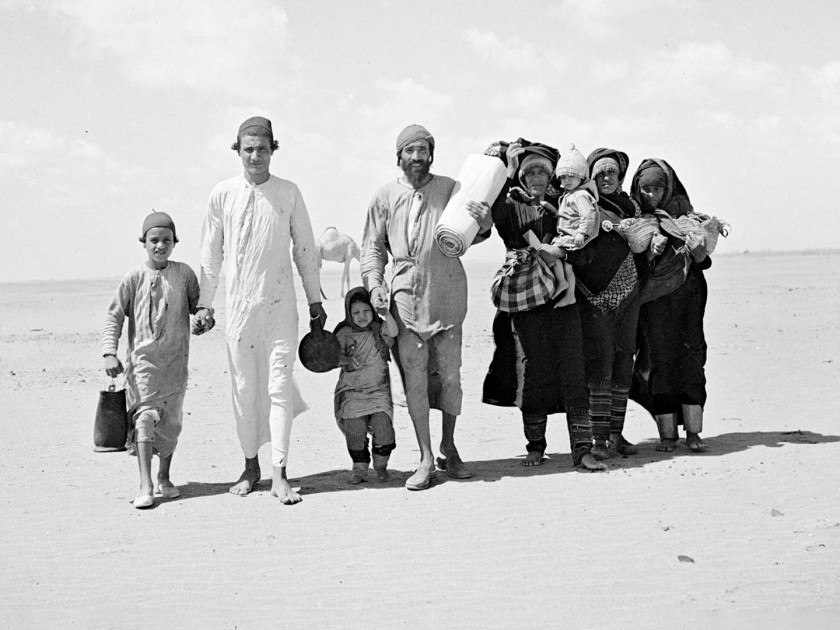
A Yemeni family walking through the desert with a Torah scroll to a reception camp near Aden, 1949 Photo: Zoltan Kluger / Government Press Office (Israel) Image courtesy of the publisher
Jews have lived in the Middle East and North Africa since time immemorial. They have one of the longest, continuous written histories of any people on the planet.
With the arrival of Islam in the seventh century CE and its conquest by early caliphates of North Africa, the Iberian Peninsula, Palestine, Persia, and most of the Middle East, the Jews in these areas found themselves subjects of Muslim rulers. They became – like the Christians – second-class citizens, but were still respected as “People of the Book.” In parts of the Muslim empire they prospered; in other parts, they suffered discrimination. But nowhere did they fare as badly as the Jews of Europe.
The Jews of North Africa and the Middle East continued to live in their ancestral homelands until the end of World War II. Then, with the rise of Arab nationalism and the founding of the state of Israel, their Muslim neighbors turned against them. The governments seized their property, imprisoned their leaders, and stripped them of their citizenship, forcing them to flee the places they had lived for millennia to become refugees in North America, Israel, and Europe. Their displacement and dispossession was largely ignored by the international community.
In 2009, the Sephardi Voices International (SVI) project was launched to document the lives of those who had to leave their ancient homes, and preserve, as best it can, the stories of their ancient cultures and of peoples. To date, over 450 interviews have been done, recording what life was like for the Jews living in Arab lands and Iran, what happened to the individuals who had to flee and what has become of them since. The SVI Archive contains not only the interviews, but also family photographs, school report cards, passports, property deeds, identity cards and souvenirs – a vast assemblage of materials from the world that was lost. It is housed in the Sephardi Voices International website and the National Library of Israel.
The story of the Sephardic displacement is not just a story about a vanishing set of rich cultures and peoples; it is also a story of human rights.
Sephardi Voices: The Untold Expulsion of Jews from Arab Lands ( by Henry Green and Richard Stursberg) draws on this extraordinary collection to tell the story of this forgotten catastrophe. It does so through the words of the people who lived through it. They describe their lives before the expulsions began, the terror they had to endure, and the ways in which they rebuilt their lives in the countries that embraced them. The book includes many of their family photographs and portraits. These are rare and privileged glimpses into their schools, family gatherings, marriages, and celebrations. They appear as they were then – in Baghdad, Cairo, and Algiers – and as they are now. Theirs are stories of loss, but also redemption.
Their story is told historically. It begins with the first Jew, Abraham, and moves forward through the vast reaches of Jewish history – the kingdoms, the exiles, and the defeats – to the emergence of Arab nationalism and Zionism in the late nineteenth and early twentieth centuries. It describes the deadly tensions caused by the clash of these ideologies. And it works its way through the great events of the post-World War II period: the founding of the state of Israel, the War of Independence, the Six Day War, the Algerian War of Independence, the Yom Kippur War, and the Iranian Revolution.
These events are seen and heard through the voices of the displaced. There are wealthy bankers and businessmen from Baghdad, friends of the last king of Egypt, impoverished artisans from the Casbah in Algiers, mountain peasants from Morocco, intellectuals and Nobel prize winners, schoolgirls in Yemen, daring smugglers, and influential politicians. There are witnesses to the pogroms in Libya and Egypt, the burning of the synagogues in Syria, the Farhud in Iraq; there are passengers on the great airlifts of the Magic Carpet and Operation Ezra and Nehemiah; there are families escaping through the mountains of Kurdistan into Iran; there are husbands smuggled in carpets into Iran in search of their wives. There are fortunes rebuilt in London and New York; there are novels written and prizes won.
The story of the Sephardic displacement is, of course, not just a story about a vanishing set of rich cultures and peoples; it is also a story of human rights. It is a story of not just what was lost to the Jews, but what was lost to the countries that expelled them.
Richard Stursberg is the author of The Tower of Babble (2012), named by The Globe and Mail (Canada’s national newspaper) one of the best books of the year; and The Tangled Garden (2019), which was shortlisted for Canada’s Donner Prize for the best book on public policy. He is the President of PEN Canada and Chairman of Sephardi Voices International.